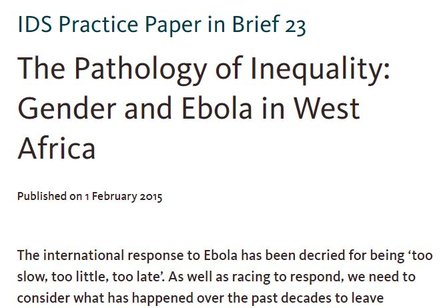
The international response to Ebola has been decried for being ‘too slow, too little, too late’. As well as racing to respond, we need to consider what has happened over the past decades to leave exposed fault lines that enabled Ebola to move so rapidly across boundaries of people’s bodies, villages, towns and countries.
Gender is important to these fault lines in two related spheres. Women and men are differentially affected by Ebola, with women in the region taking on particular roles and responsibilities as they care for the ill and bury the dead, and as they navigate ever-diminishing livelihood options and increasingly limited health resources available to pregnant women. Furthermore, structural preconditions in ‘development’ itself have deepened these gendered fault lines.